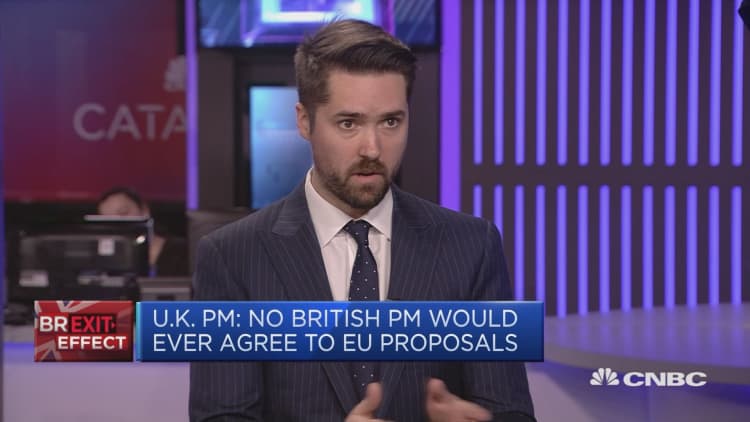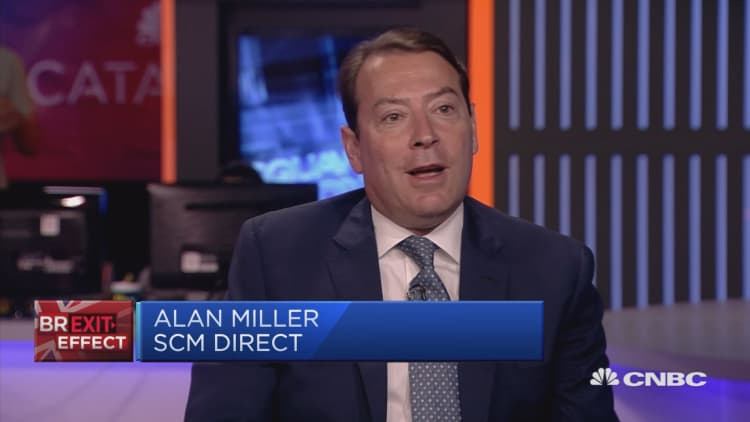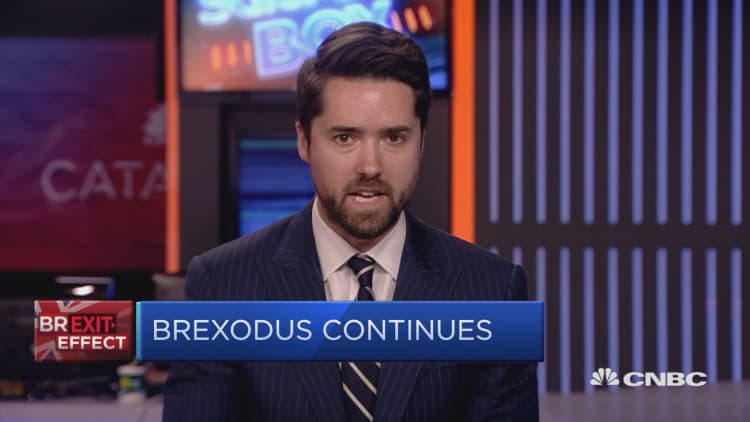
Investors should start preparing for a scenario in which the U.K. does not reach an agreement with the European Union over Brexit, a political analyst told CNBC Tuesday.
The U.K. voted in June 2016 to leave the EU, but the process to leave the bloc has proven long and rich in technical details. No matter what, the departure date has been scheduled for March 29 next year — meaning that negotiators have about six months to conclude negotiations on aspects such as the movement of people and goods across the border between Northern Ireland and the Republic of Ireland.
Technical details aside, the politics of Brexit are also not helping. David Davis, the chief Brexit negotiator for the U.K., and Boris Johnson, the foreign minister and perhaps the most vocal Brexit supporter, both resigned Monday over differences with the prime minister. A lack of support from within her own political party could spark a leadership challenge, or even lead to another general election.
Following both resignations, Theresa May told the U.K. Parliament that preparations for a “no deal” scenario would be stepped up and that lawmakers should prepare for a number of outcomes.
“Markets have been remarkably sanguine about the possibility of a no Brexit scenario and I think they do actually have to start taking it a little bit more seriously now,” Richard Mylles, political analyst at Absolute Strategy, told CNBC’s “Squawk Box Europe” Tuesday.

“We’re in a situation where there’s no obvious parliamentary majority for any form of Brexit, which is viable, we’ve got various asymmetric negotiations with the EU-27 (the other countries in the EU), there’s very little flexibility on the EU-27 side … The last 48 hours have shown that essentially the U.K. may be reaching the limits of the concessions that it’s able to make and yet we are still nowhere near a sort of credible, realistic package,” he added.
What would be the impact of a no-Brexit deal?
Goods entering the European customs union from abroad face controls — in total there are 405 checks, with beef going through 22 steps. However, once they are inside the customs union there are no further checks. If the U.K. leaves the customs union then the same controls will be applied to goods originating in the U.K.
“The U.K is not currently subject to any of these controls. However, if we leave the EU without a deal, that will change. This will lead to a significant increase in administration for most goods and a risk of substantial delays at borders,” the British Retail Consortium (BRC) said in a statement at the end of June.
The BRC added that food and beverage products could see the cost of importing from the EU go up by as much as 29 percent and non-food goods could face increases of up to 7 percent in the case of clothing and textiles.
Pricier imported goods could squeeze consumer spending, becoming a drag to the economy. Pricier imported goods could also cut the margins for both businesses depending on European raw materials; and businesses depending on EU consumers. This could ultimately impact the stock market.

There could also be sharp losses for sterling.
"My feeling is that this would be a repeat of the night of the Brexit referendum with GBP falling — perhaps to sub-1.20 against the USD," Roger Jones, head of equities at London and Capital, told CNBC via email.
"(U.K.-based) international earners would outperform and domestic U.K. stocks would get hit very hard," Jones also said. This is because domestic companies would suffer from the collapse in the currency, whereas international earners would profit from the appreciation in the dollar.
Roger also noted there would be a sell-off in European markets too, given that EU-based firms would also see their trade links with the U.K. becoming more expensive.
Still confidence
However, some analysts are still confident that Theresa May will overcome the impasse and reach an agreement with the EU.
Karen Ward, chief market strategist for EMEA at J.P. Morgan Asset Management, said in an email Monday that “the fragmentation of financial services that would be caused if no deal is reached would raise the cost of capital for European businesses and could disrupt the much needed recovery in the euro zone.”
As a result, she is confident that there will be a deal with the EU before the end of this year — one in which the U.K. and the EU will have a relationship relatively similar to the one they currently have.

“By year-end, the U.K. will have negotiated a relatively soft Brexit. We would expect a broad-based rise in sterling, which will lower U.K. inflation at a time when wage growth is picking up. This would promote an upgrade to the economic outlook heading in to 2019 and most likely a faster pace of rate increases from the Bank of England,” she added.
A new round of Brexit negotiations is due to begin next week.


